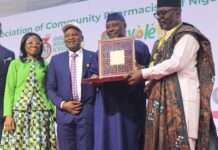The West African Health Organisation says Nigeria has greatly improved on its Maternal, Infant and Child health indices when compared to 10 years ago.
The Director-General of WAHO, Prof. Stanley Okolo, stated this on Wednesday in Abuja during a regional workshop on dissemination of the Moving Maternal Newborn and Child Health Evidence into Policy Project.
The Nigeria Maternal Mortality Rate 2000-2021 history data says maternal mortality ratio is the number of women who die from pregnancy-related causes while pregnant or within 42 days of pregnancy termination, per 100,000 live births.

Okolo said that the workshop was aimed at improving the demands for the production and use of evidence in decision-making in maternal, newborn and child health within the ECOWAS region.
This he said, necessitated the convergence of participants from across West Africa.
He noted that Nigeria fully participated in the research which yielded impressive results.
“Nigeria is doing well as the country’s maternal and child mortality index, though still high, is now relatively down.
“In Nigeria, we have about three centres that participated. We had a centre in Benin, where they used SMS texting to women during pregnancy, to ensure that women were monitored during pregnancy and child birth; and when they had problems, they called somebody.
“That absolutely showed a reduction in the number of women and children who suffered harm during pregnancy.
“Then, there was another one that was done in Bauchi, where what they did was to try and understand how to get the family to participate in the pregnancy.
“So, they used video communication to ensure the community participated.
“We have always been traditional people in Africa and so, it is really important to get the family to focus on pregnant women. ”
According to him, this community involvement acts as a support to reduce the number of women who suffer harm due to pregnancy related issues.
Also, it increases the number of women who have successful child birth and also reduces the number of infant mortality
Okolo said that the third assessment done in Nigeria was on how to use family support to address the issue of postpartum depression, of which was also addressed.
The D-G said that WAHO had started implementing the research done in Benin in about ten states in Nigeria.
He also added that the research, which spanned for over six years, had aligned the researchers with policy makers and hoped it would ultimately achieve its desired results.
On his part, Nigeria’s Minister of Health, Dr Osagia Ehanire, commended the multilateral support West Africa Nations had received from Canada and particularly for Nigeria’s inclusion in the project.
Ehanire, who was represented by Dr Ngozi Azodoh, Head of Research and Development, FMOH, said the project was part of the Canadian initiative’s “Innovation for Maternal and Child Health in Africa (IMCHA)”.
According to her, this has funded eight research projects implemented by six research teams in Burkina Faso, Mali, Senegal, and Nigeria from 2014 to 2021 in West Africa.
“Nigeria constitutes just one percent of the world population, but accounts for 13 per cent of the world maternal and under-five mortality.
“Every day, approximately 830 women die from preventable causes related to pregnancy and childbirth. For every woman who dies in childbirth, a lot more suffer injuries, and other form of morbidities.
“Globally, an estimated 289, 000 maternal deaths and maternal mortality ratio (MMR) of 210 maternal deaths per 100, 000 live births occurred in 2013 and Nigeria accounted for 13 per cent of all maternal deaths in 2013.
“While in 2015, the maternal mortality ratio for Nigeria was 814 per 100,000 live births.
“Even more devastating is the knowledge that, according to research, essential interventions reaching women and babies on time would have averted most of these deaths.
“It is obvious that we need evidence to combat the burden of maternal and infant mortality,” he stressed.
He noted that focus on Research and Development on safe pregnancy, antenatal and delivery, postpartum maternal care, newborn and infant health remain an integral part of the solution to Nigeria’s poor indicators in these areas.
“Increasing our understanding of health-seeking behaviors to inform healthcare interventions will go a long way in reducing maternal and child morbidity and mortality,” he said.
The minister added that the Federal Government was committed to all avenues suitable for the purpose of expanding the country’s research architecture.
In his address, the Acting High Commissioner of Canada to Nigeria, Mr Nicolas Simard, urged that the evidence generated from the research projects becomes very helpful for future maternal and newborn health programmes in Nigeria.
“Research and evidence-based policy making in the health sector are critical to ensuring better health outcomes in Nigeria and in the ECOWAS region.
“Also, in creating great partnership between Canada and WAHO to improve women’s sexual and reproductive health and children’s health in West Africa,” Simard said. (NAN)
AIR/VIV













